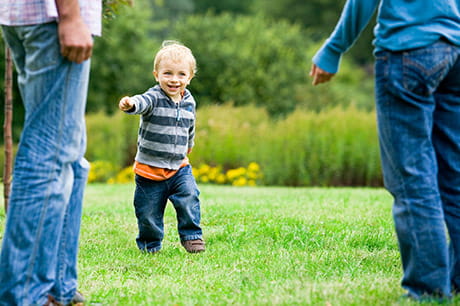Kids with allergies don’t need to be cooped up indoors
Follow these tips for allergy relief
The sniffling, sneezing and watery eyes of allergy season can make a fun day outdoors almost unbearable. If your child is prone to seasonal allergies and also has asthma, the combination can be dangerous. Allergies can disrupt sleep, which causes irritability; increase inability to concentrate; and lower quality of life in general. However, with some preparation and a few small changes, your child can still enjoy playing outdoors while minimizing their symptoms.
“The substances that cause allergy symptoms, called allergens, are around us all the time,” said Geisinger allergist and immunologist Yoon Kim, DO. “Making a few changes to your activities outdoors can help your child avoid many of their symptoms.”
See an allergist
Knowing what you’re dealing with can help you avoid or treat the problem more effectively. If your child has experienced allergies in the past, it’s likely they will reoccur in the future. Your doctor may suggest that your child visit an allergist to pinpoint exactly what the triggers are.
“Many allergies are seasonal. For instance, if you’re allergic to tree pollen, you may want to avoid spending long periods outdoors in the spring when tree pollen is at its peak in our area,” said Dr. Kim. “Taking allergy medications preventively is also a good strategy for minimizing symptoms.”
Check the weather
Hot, dry and windy weather conditions are especially troublesome for allergy sufferers. The wind picks up pollen, and the dry conditions make it easier for the pollen to travel through the air.
“While the wind and heat help the trees, flowers and plants to pollinate, it’s not a good situation if you have allergies,” said Dr. Kim. “All of that pollen reaches your eyes, nose and lungs, triggering allergic symptoms such as itchy eyes, a runny nose and difficulty breathing.
Many weather reports include pollen and mold counts. Pay attention to the numbers – and when the counts are high, try to limit time spent outdoors.
Watch out for caterpillars
Kids love bugs, and caterpillars are especially cute. However, in some people, the gypsy moth caterpillar can cause unpleasant side effects. The hairs on the caterpillar contain histamine, a chemical that can trigger an allergic response on the skin including itchiness or a rash.
“People think it’s poison ivy, but the rash may actually be from a caterpillar,” said Dr. Kim. “Teach your kids to look at but not touch the bugs they find outside.”
Keep allergens outside
Being indoors doesn’t mean you’re safe from allergens if you don’t take precautions. If your children are susceptible to allergies, keep your house and car windows closed and use your air conditioner to cool down instead. This will help keep pollen from coming indoors.
“When your children come in from playing outside, have them change their clothes and wash their hands to minimize the spread of allergens inside,” said Dr. Kim. “And don’t skip that shower before bed, since pollen in their hair can make its way to their pillows and cause symptoms at night.”
Geisinger allergist and immunologist Yoon Kim, DO, sees patients at Geisinger Mt. Pleasant in Scranton. To schedule an appointment with Dr. Kim, please call 570-718-4140 or visit Geisinger.org.

